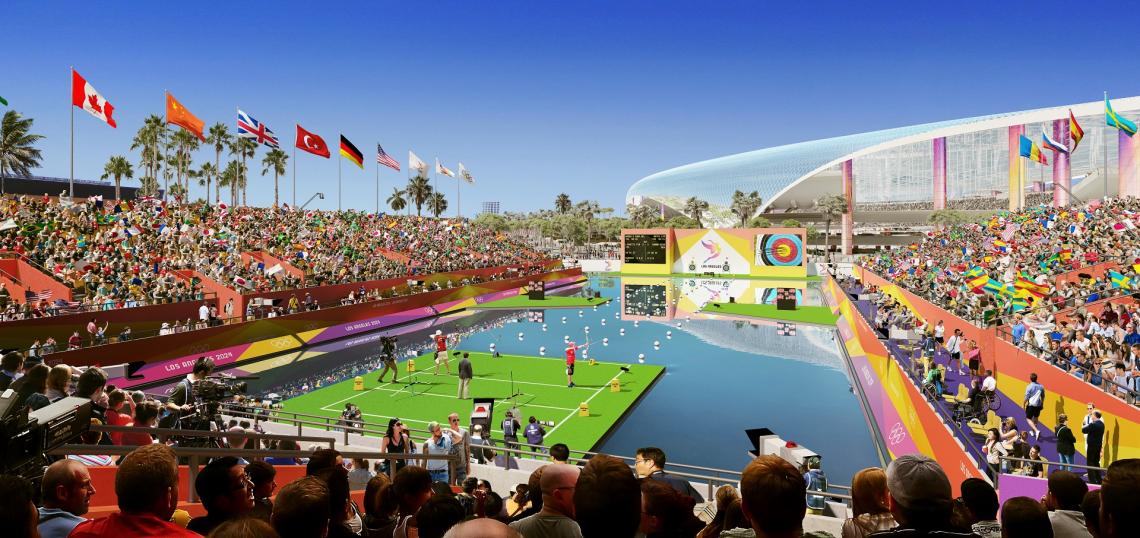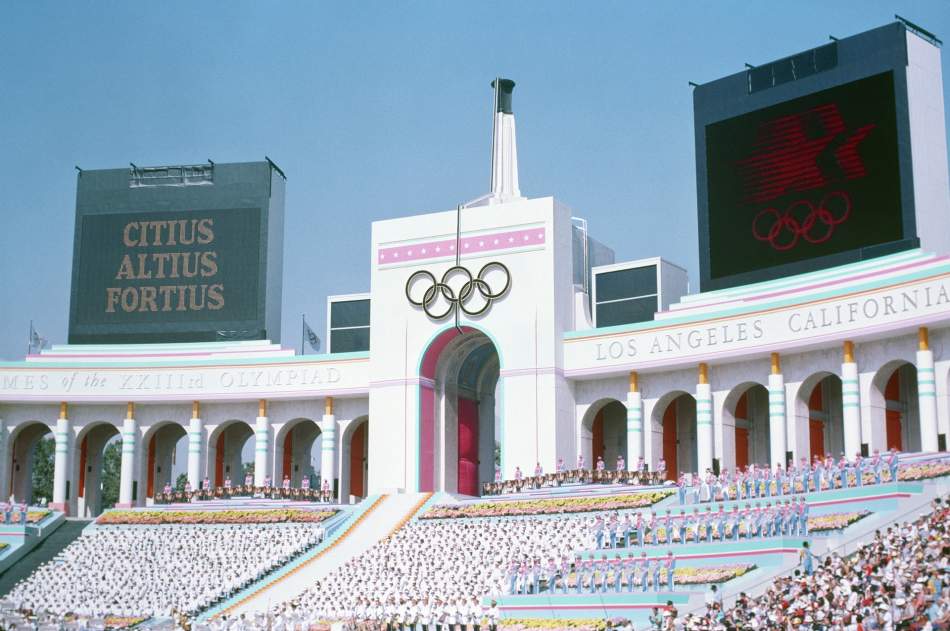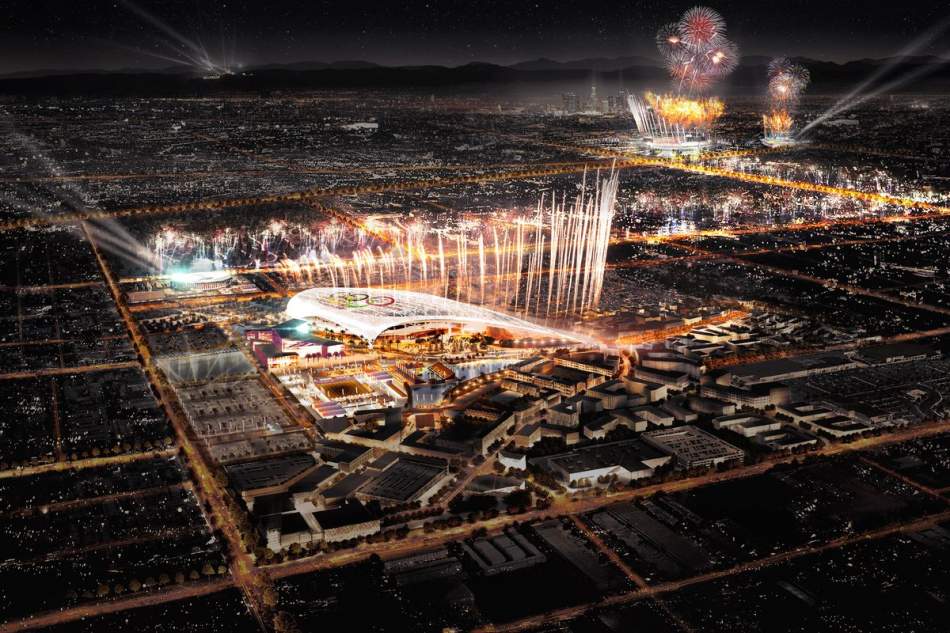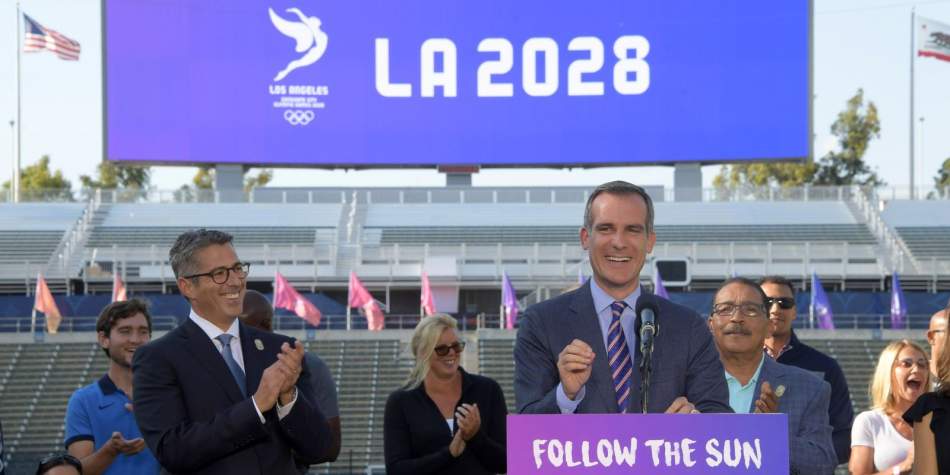
Last Monday, Los Angeles Mayor Eric Garcetti and Olympic bid chairman Casey Wasserman announced that they had reached a tentative agreement to accept the 2028 Olympic Games in exchange for a bundle of financial concessions from the International Olympic Committee. The deal, which could receive final approval in September when the IOC meets in Peru, gives the city a significant cash advance, as well as favorable arrangements for ad revenue and the IOC’s share of a potential surplus from the 2028 Games.
News of the deal has been met with enthusiasm from many corners, including those who hope to see a successful bid be leveraged to accelerate the expansion of rapid transit in L.A. The benefit of an additional four years will relieve the pressure on Metro to complete the Westwood phase of the Purple Line Extension, which had previously been “aggressively” scheduled for completion just six weeks before the Opening Ceremony. It will also give LAX additional time to construct its new automated people mover. But there is little reason to expect that other Measure M projects will be impacted by the arrival of the 34th Olympic Games.
This is largely by design. The 1984 Games still have a visible presence in the city, thanks to the LA84 foundation, and from the beginning of the bid process, there has been a self-conscious desire to replicate the economic success of the previous L.A. Olympics. The previous Games are more than just a bulwark to protect against an embarrassing and public disintegration of political support of the kind faced by bids in Boston and Rome. From a reliance on existing infrastructure to a faith in the profit-seeking power of private investment, L.A’s bid has been openly patterned after 1984.
The reports of the city’s arrangement with the IOC, in exchange for accepting the later award, rule out that the Olympic Committee will become involved in the funding of our infrastructure program. The value of the concessions Garcetti and Wasserman extracted, while they could be eventually substantial, will not be known until the 2028 Games are concluded. But it is much more likely that any direct contributions will be used to fund municipal services than regional projects. That goal has been boosted by an advance of up to $160 million from the IOC, which as with the LA84 foundation, will finance sports programs for children.
The federal government is unlikely to be much help either. In today’s dollars, Congress provided about $150 million to help fund transit infrastructure in Atlanta in 1996, and about $400 million for the 2002 Winter Games in Salt Lake City. These numbers are slight in comparison to what an acceleration of a major Measure M project would cost. The Purple Line has received federal grants and loans of more than $3.5 billion.
Salt Lake City, the most recent U.S. Olympic host, eventually received about $2 billion total from the federal government, a sum that was called a “disgrace” by Senator John McCain. The spending program led to congressional calls for a report on frivolous spending related to the Games. For his part, bid organizer Mitt Romney defended the federal funding as essential spending overall, but derided as wasteful the money used to construct two light rail lines for Salt Lake City.
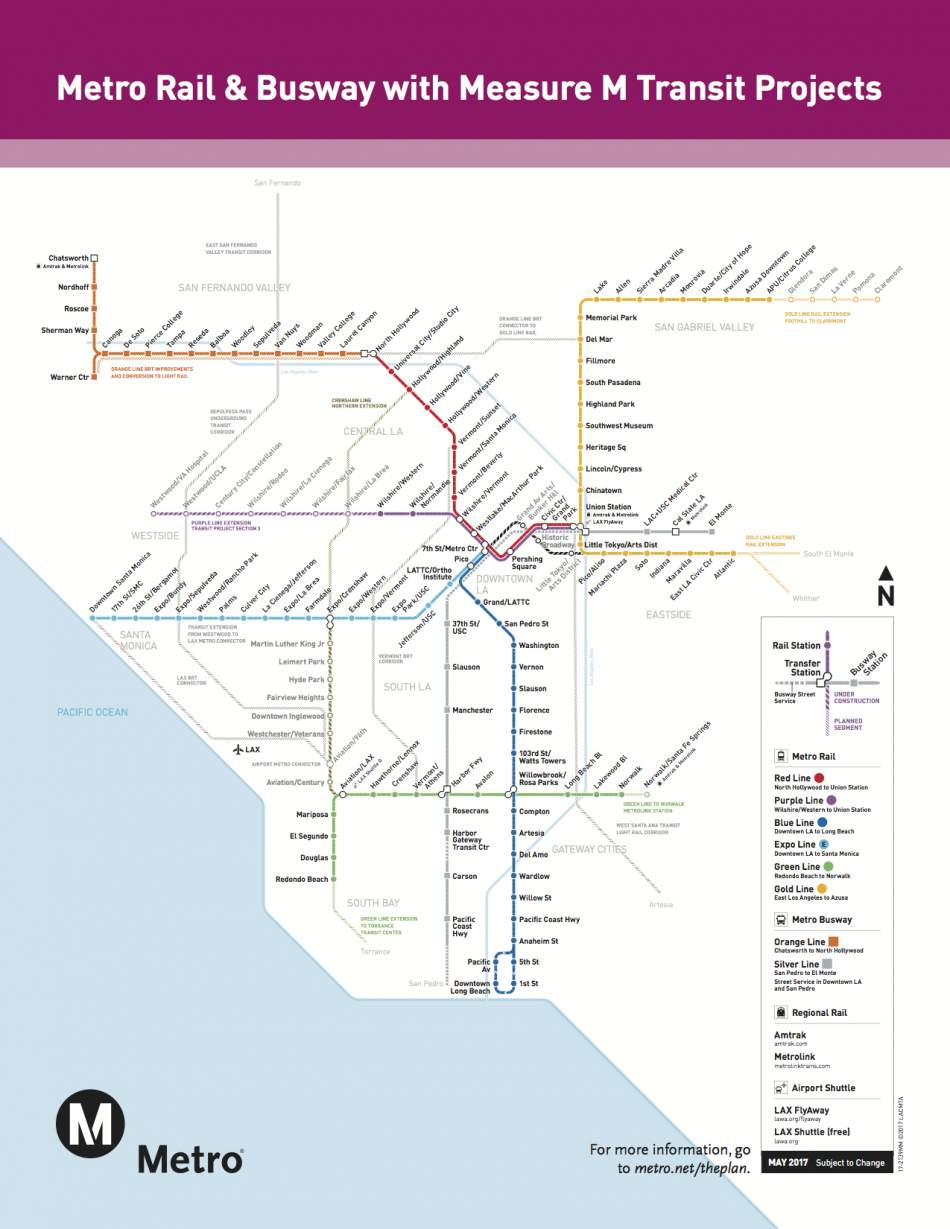
In more modern times, Metro CEO Phil Washington has repeatedly made note this summer that the White House has been using the success of cities like Los Angeles, Seattle, and Denver in taxing themselves for transportation improvements as evidence of a diminished need for existing transit grant programs. Perhaps the most meaningful victory that Los Angeles can hope for is a signed full funding grant agreement for the third section of the Purple Line.
In California, the political details are different, but the end result is likely similar. The state offered up a financial backstop for the Los Angeles Games last year, but the authorization was only valid for a 2024 bid. Now the Los Angeles City Council will have to sign their support for a 2028 bid without knowing the status of their $250-million contingency from the state. In the last several months, the state legislature has gone through two rending legislative efforts, passing the SB1 gas tax increase and the extension of California’s cap and trade program.
While the state is certain to support the bid vocally, directing additional money to Los Angeles because of a sporting event is probably off the table. Sacramento leaders have expended much in the way of political capital lately, and still have the housing crisis left to consider. Perhaps most importantly, Los Angeles, which has said that only the Purple Line and the LAX people mover are central to its bid, isn’t going to ask for more than what it’s getting.
To a certain degree, Los Angeles has built its bid on being the Olympic City of Last Resort. After Boston made an abrupt about face as the American bid city, Garcetti successfully pitched L.A. to the United States Olympic Committee as the unsinkable backup, with high support in polls and a bevy of available world-class arenas. The mayor has frequently claimed that Los Angeles could host the mega-event on a moment’s notice, or far into the indefinite future.
Central to that flexibility has been the fiscal conservatism of the bid from the start. Risk avoidance also allowed the city to have a strong negotiating hand in accepting the later 2028 Olympics. Compared to the 2024 Games, the 2028 bid involves a greater forecasting uncertainty that would make it an unpalatable or flat-out unworkable for most contestant cities, including Paris. The IOC’s deal with L.A., based on a possible but not guaranteed surplus, incentivizes continued prudence from the bid committee. Put simply, it would be strange to start adding costs now.
If the underlying purpose of the Los Angeles 2028 Games is to show that the 1984 ethos is still valid, that requires caution not only in direct spending, but also in indirect commitments. In the GAO report (PDF – page 29) on federal spending for the Olympics, there is a comment that “Los Angeles city officials did not develop, modify, or accelerate the city’s planned highway, transit, or other capital improvement projects to prepare the city to host the Games… [C]ity officials believed that host cities for Olympic Games held before 1984 often overextended themselves by trying to complete… related capital improvement projects.”
Good, bad, or otherwise, this is the philosophy at the core of 2028 bid. Metro will continue to pursue acceleration of Measure M projects, but that effort will occur parallel, and not tandem, to the return of the Olympics.
Scott covers transportation and governance issues from his home in Silver Lake. Follow him on Twitter @safrazie.
- Olympics Archive (Urbanize LA)
- Metro Archive (Urbanize LA)




